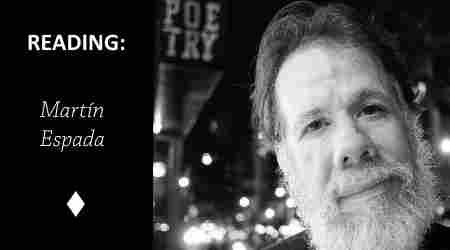Martín Espada (b. ) is an American poet, critic and attorney with Puerto Rican roots. His most important influence was his father, a community organizer and social justice activist. Poetry for him is giving a voice to the voiceless. I read a hommage to his father.
The Sign in My Father’s Hands
—for Frank Espada
The beer company
did not hire Blacks or Puerto Ricans,
so my father joined the picket line
at the Schaefer Beer Pavilion, New York World’s Fair,
amid the crowds glaring with canine hostility.
But the cops brandished nightsticks
and handcuffs to protect the beer,
and my father disappeared.In 1964, I had never tasted beer,
and no one told me about the picket signs
torn in two by the cops of brewery.
I knew what dead was: dead was a cat
overrun with parasites and dumped
in the hallway incinerator.
I knew my father was dead.
I went mute and filmy-eyed, the slow boy
who did not hear the question in school.
I sat studying his framed photograph
like a mirror, my darker face.Days later, he appeared in the doorway
grinning with his gilded tooth.
Not dead, though I would come to learn
that sometimes Puerto Ricans die
in jail, with bruises no one can explain
swelling their eyes shut.
I would learn too that “boycott”
is not a boy’s haircut,
that I could sketch a picket line
on the blank side of a leaflet.That day my father returned
from the netherworld
easily as riding the elevator to apartment 14-F,
and the brewery cops could only watch
in drunken disappointment.
I searched my father’s hands
for a sign of the miracle.
The opening lines read like a newspaper article, until the cops start beating up Frank with their nightstickes ‘to protect the beer / and my father disappeared’. The subtle rhyme opens up the poetic dimension.
The boy mourned his father’s death, not knowing that he was still alive. It was 1964. The Jim Crow laws of racial segragation were abolished on 2 July 1964 when President Lyndon Johnson historically signed the Civil Rights Act of 1964.
When the father reappears ‘days later’ (three days would have been kitsch) the boy begins to learn. He loses his endearing naivity (a boycott as a boy’s haircut – I have believed similar things when I was young, but never saw my father disappear like that).
The cops have turned into drunken thugs, disappointed about the freedom of the activist. And Martín searches his father’s hands for the sign of the miracle. I don’t know what to make of this. I don’t think there is a Christian connotation. The hands are just an activist’s hands. Maybe the miracle is what we can accomplish if we join hands.

One thought on “Reading: The Sign in My Father’s Hands by Martín Espada”
Comments are closed.